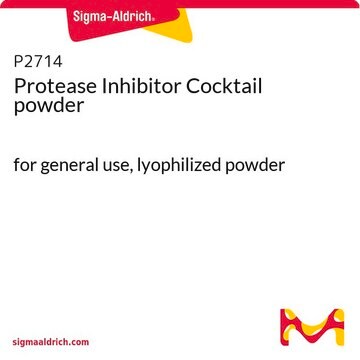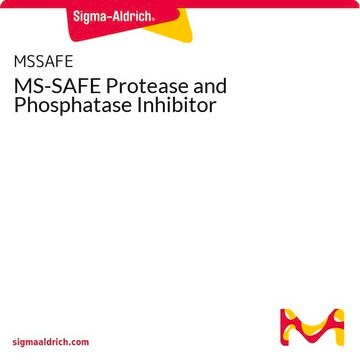Recommended Products
feature
wetted part: no
packaging
pkg of 1 mL
manufacturer/tradename
Cytiva 80-6501-23
shipped in
dry ice
storage temp.
−20°C
General description
Protease inhibitor mix.
Application
Sample preparation often requires the inhibition of protease activity. Cytiva offers this combination of competitive and noncompetitive protease inhibitors, which protect Proteins from proteolysis during purification from animal tissues, plant tissues, yeast and bacteria.
Features and Benefits
- Protease inhibitor cocktail specifically developed for sample preparation in 2-D studies
- No EDTA is used, which allows optimal nuclease activity for removing nucleic acids from samples
- Contains a mixture of both competitive and noncompetitive protease inhibitors that inhibit serine, cysteine, and calpain proteases.Optionally, EDTA may be added to inhibit metalloproteases.
- Optimized concentration for excellent inhibition of protease activities.
- Effectively inhibits over 95% of protease activity.
Storage and Stability
Please be aware this product may be shipped 90 days before the expiration date. For more information on the batch specific expiration date, please contact technical service.
Analysis Note
To view the Certificate of Analysis for this product, please visit www.cytiva.com.
Signal Word
Warning
Hazard Statements
Precautionary Statements
Storage Class Code
10 - Combustible liquids
Certificates of Analysis (COA)
Search for Certificates of Analysis (COA) by entering the products Lot/Batch Number. Lot and Batch Numbers can be found on a product’s label following the words ‘Lot’ or ‘Batch’.
Already Own This Product?
Find documentation for the products that you have recently purchased in the Document Library.
Customers Also Viewed
Natalia Mota-Martorell et al.
GeroScience, 42(4), 1157-1173 (2020-06-25)
Species longevity varies significantly across animal species, but the underlying molecular mechanisms remain poorly understood. Recent studies and omics approaches suggest that phenotypic traits of longevity could converge in the mammalian target of rapamycin (mTOR) signalling pathway. The present study
Xiaojing Wang et al.
Scandinavian journal of immunology, 90(3), e12791-e12791 (2019-05-28)
The epoxyeicosatrienoic acids (EETs) are products of cytochrome P450 epoxygenases and have recently been found to have an anti-inflammatory activity. However, the role of EETs in non-alcoholic steatohepatitis has not been fully understood. In this study, we investigated the protective
Natalia Mota-Martorell et al.
Redox biology, 34, 101539-101539 (2020-05-01)
Mitochondrial reactive oxygen species (ROS) production, specifically at complex I (Cx I), has been widely suggested to be one of the determinants of species longevity. The present study follows a comparative approach to analyse complex I in heart tissue from
Our team of scientists has experience in all areas of research including Life Science, Material Science, Chemical Synthesis, Chromatography, Analytical and many others.
Contact Technical Service













